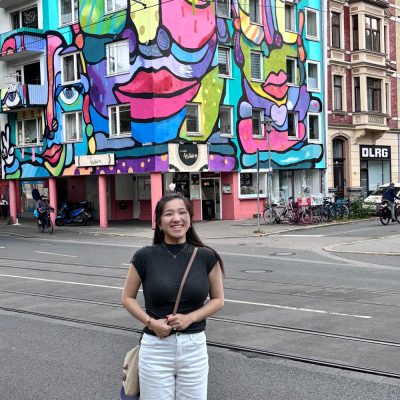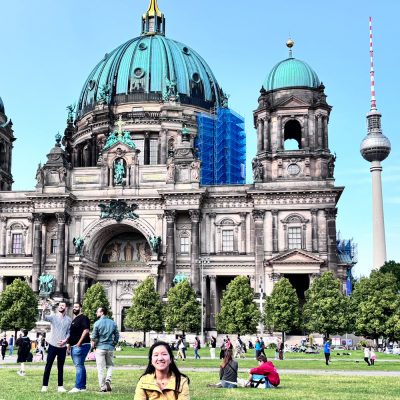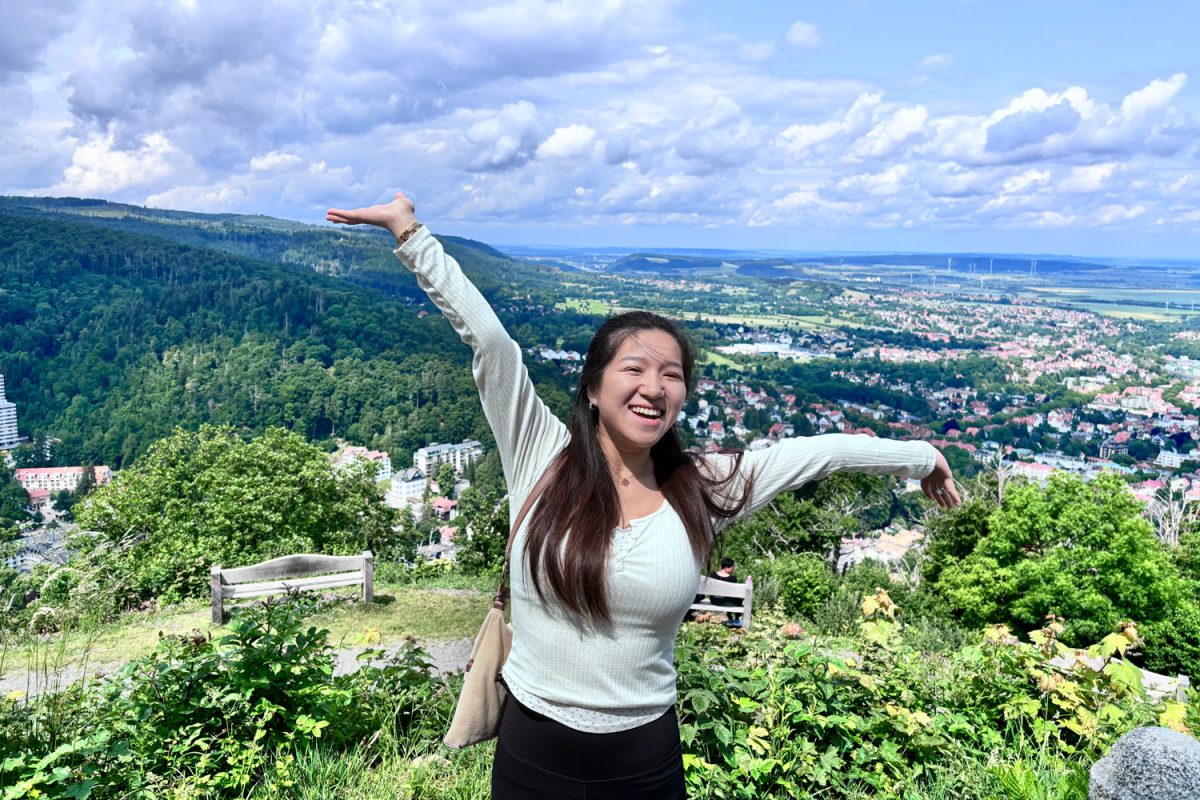Mail from … Braunschweig Exploring Special Education and Cultural Exchange
Yueru Wang, doctoral student at the University of Rhode Island specializing in Special Education and Teaching English to Speakers of Other Languages, took part in a one-week program at TU Braunschweig to explore German approaches to special education and disability studies.
General Information
This is what I did in Braunschweig:

Here you can see me at a particularly colorful corner in Braunschweig. Picture credits: Yueru Wang/TU Braunschweig
I joined a short faculty-led program organized by the University of Rhode Island, focusing on special education and disability studies through school visits and academic exchange at TU Braunschweig.
That’s why I decided to come to TU Braunschweig:
I was interested in learning about special education in Germany and how disability is understood and supported in a different cultural and school context.
What differences did you notice between your research topic in Germany and in your home country?
The German schools we visited emphasized hands-on learning, student autonomy, and early vocational pathways, which contrasted with the more standardized systems I experienced in China and the U.S.
That’s what I knew about TU Braunschweig and the city of Braunschweig before I arrived:
Before arriving, I had heard that TU Braunschweig was a top technical university in Germany and that the city had a rich academic tradition.
Living in Braunschweig
That’s what my days in Braunschweig looked like:
Each day was filled with school visits, cultural activities like city tours, academic exchanges, and group reflections with both German and American students.
This is how I lived in Braunschweig:
I stayed at DJH Youth Hostel with other program participants.
What is the difference between everyday life in Germany and in your home country?
In Germany, people tend to be more independent in their daily routines—students walk or bike to school, and even younger children use public transit. Life felt more structured and less hurried than in China or the U.S., with a strong respect for personal time and public order. One thing I noticed was that many shops close earlier, which made me more aware of how I plan my time.
That’s what I learned during my time here:
I found that German schools emphasize student autonomy, early career development, and hands-on learning. During our school visits, I observed some strong efforts to support special education, such as team-teaching models and adapted classroom activities. However, I also came to understand that the teaching of scholars with special needs in Germany is still developing and varies greatly by region and school type. While some schools strive to fully integrate students with special needs into general education settings, others still rely on separate special education schools. In this sense, special education often functions more as a parallel structure rather than something fully embedded in the system. This contrast between policy intentions and everyday realities helped me reflect more deeply on what meaningful inclusion truly looks like.
That was the biggest challenge of my stay …
Waking up early and navigating unfamiliar public transportation on a tight schedule could be a bit stressful at times. I also found it challenging to articulate my thoughts in English—especially during emotional moments, like after visiting schools or hearing people’ personal stories.
What I took home with me from here:
I brought back a Braunschweig-themed notebook, a canvas tote bag, and a pen—small things, but they’ll remind me of the time I spent there.
More importantly, I took home the kind of learning that doesn’t come from lectures: how people listen, collaborate, and show care in everyday moments.
What I’ll remember most are the conversations, shared meals, and little moments of laughter with both URI and German students.
Good to know
This is my tip for other international students or academics who are planning a stay abroad in Germany or are currently doing so:
Be present and open to every part of the experience. Even brief exchanges with teachers or classmates can lead to profound insights. Don’t worry about having perfect language skills—what matters most is your willingness to connect, listen, and reflect.
In my opinion, this is something that you should definitely try out in Braunschweig/Germany:
Try joining a guided city tour. Braunschweig has a rich medieval history and beautiful architecture that tells stories beyond the classroom.
Try the Tree Top Walk in Bad Harzburg—it’s only an hour away and gives you a beautiful view of the forest canopy.
My favourite memory of my stay in Braunschweig:
My favourite memory was sitting by the river with classmates after a long day. We were just talking, listening, and being there for each other. It made me realize that inclusion isn’t always about big systems—it can also be those small moments when people feel heard and supported.
This is something I would like to add/tell you about:
Even if you’re only here for a week, let yourself fully be in it. Absorb the details, make connections, and reflect as you go. This experience reminded me that the best learning doesn’t always happen in classrooms—it happens in conversations, shared spaces, and quiet moments.


